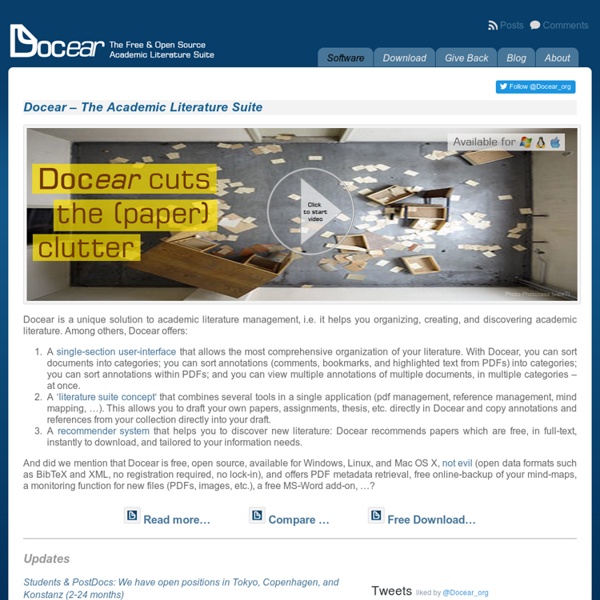



Search - The University of Arizona Campus Repository This dissertation examined the relationship between Hispanic population proportion (HPROP) and an index variable indicating the provision of library services to the Spanish-speaking in the State of Arizona (PLSS). Mailed in the summer of 1999 to 169 public library facilities, a survey collected information on libraries' provision of Spanish-speaking personnel, Spanish-language materials, and Spanish-format library services. Regression analysis indicated that HPROP has a significant effect upon PLSS (B = .600, p < .0001). An analysis of covariance (ANCOVA) procedure indicated that libraries in metropolitan areas were more likely than non-metropolitan libraries to provide service to Spanish-speakers (F = 106.72, p < .0001).
Bring Your Articles to Life with ReadCube's Enhanced PDF "The enhanced PDF made the "normal" PDF's jealous. The reference integration should be available in every PDF reader, it's that good!" Dan Turmand Emmanuel College "It's great. Michael Ross Northwestern University "I love that everything is inline! Jordan Reuter Microbiology and Cell Science student, University of Florida "ReadCube is where software should be heading. Jen Humphrey MacQuarie University "ReadCube not only provides a single all-in-one platform to carefully read an article, but also does it in a very attractive and friendly way. Israel Pichardo-Casas Instituto de Fisiología Celular, National University of Mexico
The Ubiquitous Librarian June 10, 2015, 1:56 pm By Brian Mathews June 8, 2015, 1:55 pm Carrie Donovan A few weeks ago I heard Carrie Donovan (Head of Teaching and Learning, Indiana University Libraries ) give a keynote address at The Innovative Library Classroom Conference. Here are the slides from her talk: Shaking up the Sediment: Re-energizing Pedagogical Practice while Avoiding Bottle Shock. My main takeaway was the transition that Carrie is experiencing from teaching to consulting. [caption id=”attachment_4953″ align=”aligncenter… Read More June 5, 2015, 2:53 am Should librarians challenge the status quo? I decided to ask a professor. You’ve mentioned online that libraries should challenge the status quo. Read More June 3, 2015, 10:21 am Here is a quick interview with Andrew Whitworth, Senior Lecturer in the School of Education at the University of Manchester and Programme Director of the MA: Digital Technologies, Communication and Education. What is radical information literacy? Mainstream IL – competency-based,…
colwiz | Your Research Life - Organized The Embedded Librarian | Exploring New, Embedded Roles for Librarians in Organizations of All Types EndNote - EndNote X3 doesn't have the Emory U connection file to connect directly to EUCLID. How can I get it? If you have a pre-X5 version of EndNote, get the NEWLY UPDATED (Feb 2011) EmoryU connection file here. Should I use one library for all my references, or separate libraries for different projects? It's entirely up to you; there's no right or wrong way to organize your files. However, it is usually recommended to have one library to make it easier to create bibliograpies in Word. I already have a long bibliography that I typed in Word. Unfortunately there's no way to do this automatically. How do I download search results from my favorite database into EndNote? Every database works a little differently. I tried using a connection file to search a database, but it asks for a password. EndNote includes connection files for databases to which Emory doesn't subscribe, so you may not be able to connect. How do I add page numbers to an in-text citation?
ALA TechSource ALA TechSource, an imprint of the American Library Association, publishes Library Technology Reports and Smart Libraries Newsletter. Library Technology Reports, published in eight issues annually, helps librarians make informed decisions about technology products and projects. Reports are authored by experts in the field and may address the application of technology to library services, provide thorough overviews of library technology, offer evaluative descriptions of specific products or product classes, or cover emerging technology. Smart Libraries Newsletter, published monthly, offers Marshall Breeding’s news and analysis on products, vendors, and new developments in the library automation marketplace. Subscribers receive timely coverage of significant events about library technology products and organizations. Print subscriptions include access to digital versions. To subscribe, view our subscription pricing and offerings page!
Flow